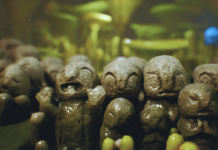The lawsuit against AI art is finally here. A class-action legal action has been filed by several artists against Stability AI, Mid journey and DeviantArt. Courtesy of Ars Technica, more information emerged.
Who is targeted by the lawsuit against AI?
Artists have launched a class-action lawsuit in California saying that Stability AI, Mid journey, and DeviantArt have violated their copyright.
The problem is largely caused by the machine learning algorithms that took benefit of copyrighted photos. These photos are part of enormous data catalogues used to train the AI art-generating technologies, which are frequently used without the consent of artists or any kind of financial reimbursement.

Who filed the lawsuit against AI art generators?
As mentioned above, thanks to Ars Technica we have more details about the lawsuit. It seems that it was filed by the Joseph Saveri law firm. The artists that are taking action are Sarah Andresen, Kelly McKernan and Karla Ortiz. The text of complaint submitted by the accusing party contains the following claims: “seek to end this blatant and enormous infringement of their rights before their professions are eliminated by a computer program powered entirely by their hard work”.
Alex Champandard criticized the lawsuit in a Twitter post, explaining how latent diffusion image synthesis works and saying that the plaintiffs did incorrectly compare the trained AI model with something like “having a directory on your computer of billions of JPEG image files” while claiming that “a trained diffusion model can produce a copy of any of its training Images”. This is probably right but still, there are many artists that get their art used without any compensation being received.
What's the prediction?
I don't trust the lawyers who submitted this complaint, based on content + how it's written. The case could do more harm than good because of this.
There is a constructive middle ground to be found but I'm not sure it'll happen with these participants!
— Alex J. Champandard ❄️ @[email protected] (@alexjc) January 15, 2023

Based on this, the AI models are not doing anything wrong and the lawsuit against AI will most likely be settled outside of court with some money being shared with the plaintiffs.
In the event that the case goes to trial, the courts will have to distinguish between claimed ethical violations and legal violations. In an effort to prove that AI firms earn handsomely from using copyrighted photographs, the plaintiffs want both substantial monetary damages and permanent injunctive relief to stop allegedly violating corporations from committing further violations.
One funny thing noticed by a Twitter user is that one of the lawyers, if not specifically the one who filed the lawsuit against AI, is having his own profile photo generated by an AI software. This is pretty ironic, right?
The man who is filing the lawsuit for "improper" use of ai art tools used an ai art tool to generate the profile picture he is using in the same site he made for the lawsuit. But i am sure he invented pointillism right?! The brilliant mind of Matthew Butterick ladies and gent's😂 pic.twitter.com/JjDTEojsb2
— são Tiago de Peso da Régua (@Accuso1) January 15, 2023
It will be surely intriguing to follow this issue, mainly since any legal action taken might create a precedent for future AI-related court cases. In a world where AI grows by the day, like OpenAI’s ChatGPT, the legal line runs thin.
Nevertheless, Ars Technica points out that some of the class action complaint’s details might not correctly reflect AI technology, as we can tell above, on Alex’s Twitter thread. As a result of these unclarities, the lawsuit against AI might eventually falter.



